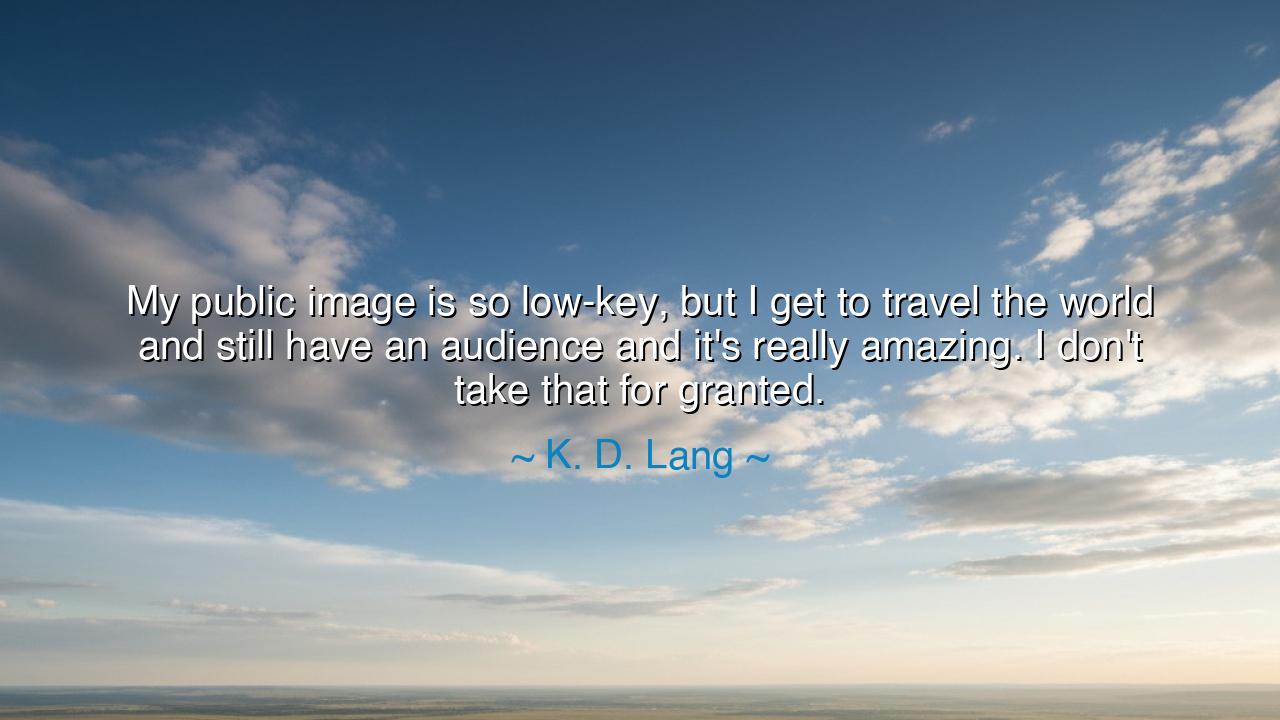
My public image is so low-key, but I get to travel the world and
My public image is so low-key, but I get to travel the world and still have an audience and it's really amazing. I don't take that for granted.






Hear, O listener, the words of K. D. Lang, who spoke with humility and gratitude: “My public image is so low-key, but I get to travel the world and still have an audience and it’s really amazing. I don’t take that for granted.” In these words lies not only the reflection of an artist, but the wisdom of one who has walked the path of fame without being consumed by its flames. For she reveals a paradox: though she does not shine with the blinding glare of celebrity, her art has carried her across nations, binding her to an audience that remains faithful.
The essence of her saying is that quiet strength endures. Many seek recognition in the thunder of applause and the glare of lights, but Lang finds her blessing in the balance: her low-key image shields her from the madness of constant scrutiny, yet her music grants her the gift of traveling the world and touching hearts across cultures. She teaches us that true influence is not always accompanied by noise; sometimes it is found in the steady flame that warms, rather than the wildfire that burns.
The ancients knew well the peril of glory without balance. Consider the tale of Diogenes the Cynic, who lived simply in Athens while great kings and conquerors filled the earth with their names. Yet it was he whom Alexander the Great sought out, for even in his lowly station his wisdom burned brighter than armies. So too with Lang: though she does not seek spectacle, her art speaks with quiet power, and audiences across the world come to listen. It is the proof that what is modest in appearance may be mighty in truth.
Her words also carry the music of gratitude. “I don’t take that for granted,” she says, and in this we hear the humility of one who knows that audiences are not owed, but given. Fame can corrupt the soul into entitlement, but gratitude guards the heart, keeping it tender toward those who listen and those who support. Gratitude transforms the journey into wonder, so that even repeated stages and endless travels remain “amazing,” as she calls them. This, too, is wisdom: to never let familiarity steal the awe from one’s calling.
History offers us many who illustrate this. Johann Sebastian Bach, though not adorned with the flamboyance of other composers, quietly shaped the very foundations of Western music. In his day he was respected, but not adored as extravagantly as others. Yet his works traveled far beyond him, carrying his audience across centuries. His public image was humble, yet his influence was eternal. Here we see the very truth Lang names: that greatness need not shout, but can whisper across the ages.
There is also a deeper teaching about the nature of art itself. Art does not demand that the artist be a spectacle; it demands only authenticity. When an artist is true to their craft, the work itself becomes the bridge to the world. The singer, the painter, the writer need not dwell in constant spotlight, for their creations shine on their behalf. Lang’s words reveal a life where the balance has been struck: to be known enough to share, yet not so burdened as to lose peace. This is a rare gift, and she recognizes it as such.
The lesson, then, is this: seek depth, not noise. Let your work be sincere, let your craft be faithful, and trust that what is true will find its audience. Do not measure success by the brightness of the spotlight, but by the reach of your song, the endurance of your work, and the quiet gratitude you carry for those who listen. In this way, life becomes not a frantic chase for attention, but a steady journey of meaning.
And in practice: cultivate humility, give thanks for those who honor your efforts, and never confuse fame with value. Travel your road with patience, knowing that greatness often resides in the quiet places. For as Lang teaches, to live with a low-key image and yet to touch the hearts of people across the world is not a lesser triumph—it is one of the highest forms of victory, born not of vanity, but of truth.






AAdministratorAdministrator
Welcome, honored guests. Please leave a comment, we will respond soon